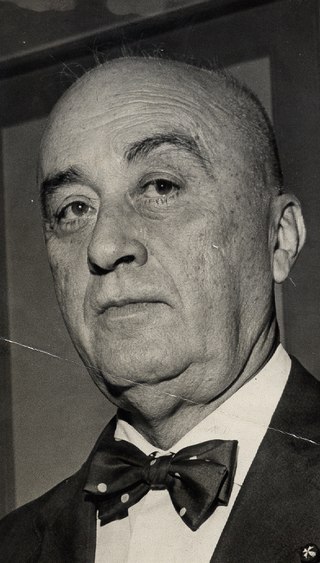
The Vargas Era is the period in the history of Brazil between 1930 and 1946 when the country was governed by president Getúlio Vargas. The period from 1930 to 1937 is known as the Second Brazilian Republic,and the other part of Vargas Era,from 1937 until 1946 is known as the Third Brazilian Republic.

The Brazilian Socialist Party is a political party in Brazil. It was founded in 1947,before being abolished by the military regime in 1965 and re-organised in 1989 after the re-democratisation of Brazil. It elected six Governors in 2010,becoming the second largest party in number of state governments,behind only PSDB. In addition to that,it won 34 seats in the Chamber of Deputies and three seats in the Senate,besides having been a member of the For Brazil to Keep on Changing coalition,which elected Dilma Rousseff as President of Brazil.

João de Deus Mena Barreto was a Brazilian general and politician who briefly served as the president of Brazil while being a member of the provisional military junta of 1930. Born into a historically military family,Mena Barreto took up a military career in 1890. He fought in several internal conflicts,including the Federalist Revolution,a civil war,the 18 of the Copacabana Fort revolt,and a 1924 revolt in the North. With the Revolution of 1930 in Brazil,Mena Barreto and Augusto Tasso Fragoso orchestrated an uprising in the Federal District,overthrowing President Washington Luís and establishing the 1930 junta. After the junta transferred power to revolutionaries,Mena Barreto became the federal interventor for Rio de Janeiro and a mediator in the Constitutionalist Revolution of 1932.

João Punaro Bley was a Brazilian military and public administrator.

Gustavo Adolfo Luiz Dodt da Cunha Barroso was a Brazilian lawyer,writer and politician associated with Brazilian Integralism and antisemitism. He was also known by the pseudonym João do Norte. Being considered a master of Brazilian folklore,he was the first director of the National Historical Museum and one of the leaders of the Brazilian Integralist Action,being one of its most prominent ideologists.

Getúlio Dornelles Vargas was a Brazilian lawyer and politician who served as the 14th and 17th president of Brazil,from 1930 to 1945 and from 1951 until his suicide in 1954. Due to his long and controversial tenure as Brazil's provisional,constitutional,dictatorial and democratic leader,he is considered by historians as the most influential Brazilian politician of the 20th century.

The Estado Novo,or Third Brazilian Republic,began on 10 November 1937,and consolidated Getúlio Vargas' power. Vargas had assumed leadership of Brazil following the 1930 revolution that ended the First Republic. The Estado Novo ended politically on 29 October 1945,and officially on 31 January 1946. It was characterized by Brazilian nationalism,centralized power,anti-communism and authoritarianism.

Events in the year 1929 in Brazil.

Events in the year 1934 in Brazil.

Events in the year 1937 in Brazil.

Events in the year 1938 in Brazil.

Events in the year 1954 in Brazil.

Olímpio Mourão Filho was a Brazilian military officer known as the author of the Cohen Plan,a forged document used to justify the Estado Novo coup in 1937,and,as head of the 4th Military Region/Infantry Division,as the precipitator of the 1964 coup d'état that installed the military dictatorship in Brazil. He reached the rank of army general and ended his career presiding over the Superior Military Court (STM) from 1967 to 1969.
Rogério da Silva Rego was a Brazilian lawyer,public servant and politician,formerly a federal deputy for Bahia.
Jutahy Borges Magalhães was a Brazilian politician.

The 1937 Brazilian coup d'état,also known as the Estado Novo coup,was a military coup in Brazil led by President Getúlio Vargas with the support of the Armed Forces on 10 November 1937.

João Cabanas was a Brazilian military officer in the São Paulo State Public Force,currently the São Paulo State Military Police. Cabanas graduated from the São Paulo Public Force Officer School and also graduated with a bachelor's degree of Law from the São Paulo Law School.

Joaquim de Magalhães Cardoso Barata,was a Brazilian army officer and politician who governed the state of Paráthree times,twice as federal interventor for the Vargas Government and once as an elected governor during the Fourth Brazilian Republic,a period where he also served as senator for the state.

The Integralist Uprising was a failed coup by the Brazilian Integralist Action (AIB) against the government of president Getúlio Vargas during the Estado Novo in Brazil. The AIB was created due to the radicalization of politics following the successful Revolution of 1930,which had brought Vargas to power,and the 1932 Constitutionalist Revolution,which had undermined revolutionary politics in favor of political extremes. Its creator,Plínio Salgado,had been influenced by fascism,ultimately starting the ritual-based,far-right organization.

The Cohen Plan was a document forged by the Brazilian military with the aim of establishing the Estado Novo dictatorship in November 1937. A conjunction between antisemitism and anti-communism in Brazilian politics,it was fraudulently attributed to the Communist International,which allegedly planned to overthrow the government through strikes,the burning of public buildings and popular demonstrations that would end in looting,chaos,and the murder of authorities. To introduce the fraud,it was "discovered" by the Armed Forces,immediately used to label the political opposition as communists,and then to legitimize the military coup d'état.















